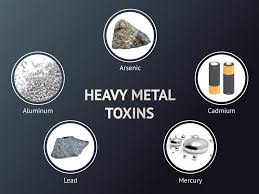Are metals blocking your minerals? Minerals such as magnesium, calcium, sodium, potassium, iron, zinc and more are essential to a healthy body. Without the right balance of minerals, the myriad of biochemical reactions that occur every second in our body just cannot happen.
So how do low levels impact our health?
Low magnesium and calcium may compromise muscle and nerve function. We hear a lot about calcium and healthy bones, but there are many more body processes that need this essential mineral. Low sodium and potassium indicate poor adrenal function and possibly thyroid and blood pressure problems. Low copper relative to zinc and low manganese may lead to weak connective tissue, brittle bones and an unhealthy cholesterol profile. High chromium to manganese ratios are associated with insulin resistance and problems with blood sugar regulation. There is more, but I think you get the idea.
What do metals do to our minerals?
 Mercury and lead are common findings. This may be a result of contamination from the environment and our foods through increasing use of chemicals, metals and the burning of fossil fuels. Mercury may be elevated due to amalgam fillings but also eating canned tuna daily. Lead contamination may be from many sources, including stripping of old paint. Low adrenal and thyroid function may turn a person into an ‘accumulator’ of toxins, rather than being an ‘excretor’.
Mercury and lead are common findings. This may be a result of contamination from the environment and our foods through increasing use of chemicals, metals and the burning of fossil fuels. Mercury may be elevated due to amalgam fillings but also eating canned tuna daily. Lead contamination may be from many sources, including stripping of old paint. Low adrenal and thyroid function may turn a person into an ‘accumulator’ of toxins, rather than being an ‘excretor’.
Lead and mercury bind with nutritional elements such as zinc, iron, calcium, selenium and magnesium, rendering them unavailable for biological use. Mercury’s effect on selenium and zinc, for example, interferes with their role of protecting skin cells from UV damage and preventing chronic inflammation. This process may be a precursor to many cancers, including breast and prostate cancer.
Clinical experience has shown a trend towards elevated arsenic – particularly people who work with raw materials such as arsenic-treated timber and metal. This may partially explain soaring rates of prostate cancer which seems to be affecting tradesmen and farmers more than others.
How do I know if metals are affecting my minerals?
Blood tests are not a reliable indicator of either metals or minerals. Metals tend to be stored in tissue out of blood circulation. For example, lead tends to be stored in bones displacing calcium. Minerals are needed to help maintain the blood’s pH (acid-alkaline) balance. Therefore, tissue is often robbed of minerals to keep the blood levels ‘normal’. Common symptoms include fatigue and depression as well as pain.
Hair Tissue Mineral Analysis and functional pathology testing are the most reliable methods of identifying metal toxicity. Once imbalances are identified, these may be successfully treated with BRT combined with targeted nutritionals and supporting the body’s detoxification systems. Both techniques are available at True Medicine where a qualified Naturopath will be able to assess any toxicity and prescribe and support you through the detoxification process.
Most important is not to assume you have any particular mineral deficiency and go out and purchase a product off the shelf. These are often sub-standard and provide minerals in the incorrect format, often leading to other problems resulting from poor absorption. A full assessment undertaken by a qualified practitioner is the best approach.
Call us at True Medicine to arrange individualised assessment of your body’s needs – 07 5530 1863.

